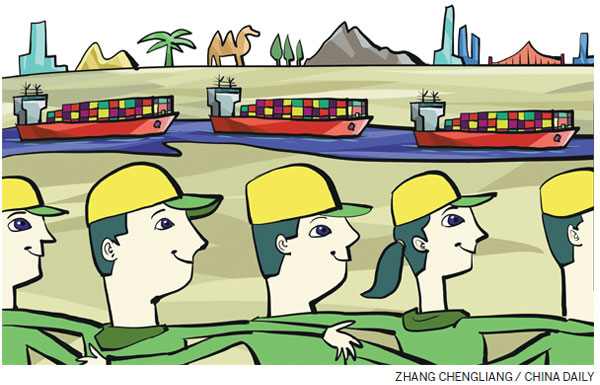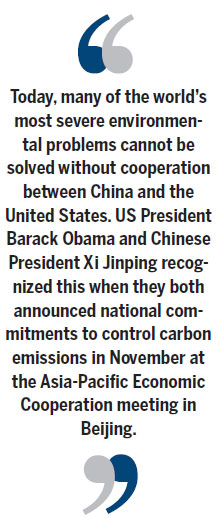How to keep Belt and Road green
Updated: 2015-05-08 07:35
By Fred Krupp(China Daily Europe)
|
|||||||||||
Chinese NGOs and their partners can help ensure the environment is integral part of initiative
Being the leading non-governmental environmental body in the United States, today's Environmental Defense Fund bears little resemblance to the fledgling organization founded by scientists in the 1960s.
We've always based our policies on the best available science, and we were the first environmental group to hire economists to help solve environmental problems. Guided by both science and economics, we find practical and lasting solutions to the most serious environmental problems.

With this foundation, the EDF has recognized that the priorities we focus on - oceans, climate, ecosystems, and health - transcend national boundaries. These are truly global problems.
The EDF's path toward internationalization reflects the changes around the world. With the globalization of information, transportation, and the economy, all of us are now connected to one another. The EDF itself has transformed from a US domestic organization to an international nonprofit with nine offices in the US and international offices in Beijing, Shanghai, London and La Paz. We truly believe it is critical to think global and act locally.
Today, many of the world's most severe environmental problems cannot be solved without cooperation between China and the United States. US President Barack Obama and Chinese President Xi Jinping recognized this when they both announced national commitments to control carbon emissions in November at the Asia-Pacific Economic Cooperation meeting in Beijing.

In recent years, many Chinese enterprises have ramped up their foreign investments at an increasing pace. China is likely to become a net capital exporter soon. The formation of the Asian Infrastructure Investment Bank is more than tangible evidence. The result is that China is a strong global economic power exerting an increasingly strong influence on the environment.
Chinese companies, investment, and culture are all going abroad. We have to ask - should Chinese environmental organizations cross boundaries as well?
Since the EDF and many other foreign environmental groups can work in China, the answer is a definite yes.
The internationalization of Chinese NGOs should be an important adjunct to China's One Belt, One Road initiative, a trade and infrastructure program inspired by ancient Silk Road trading routes. Many of the countries along these paths would benefit from sharing China's experiences of grappling with environmental problems. China knows all too well the problems and costs of pursuing development without regard for the environment.
We recognize that, for both the US and China, we do not have all of the answers, but perhaps our efforts and experience could help others to more quickly progress in environmental protection. The exploration of Chinese social groups' path toward internationalization is an urgent task. China has an important environmental story to tell.
The EDF has established a strong strategic partnership with the China Association for NGO Cooperation, and the association itself is a great example to share. One of the association's primary missions is to act as a bridge between foreign funders and Chinese NGOs focused on poverty alleviation in remote parts of the country. Acting as an umbrella organization for these smaller NGOs, the association helps mobilize funding, build capacity, and provide back-office services to promote effective project management.
One Belt, One Road offers great prospects for economic progress for many people, and I believe it can and should also become a vehicle for environmental progress. Progress also means incorporating environmental lessons that China has learned the hard way, so that it becomes a green belt and road. Trade and investment are the vehicles for this progress. These powerful engines of change should also be the vehicles for environmental progress.
Another idea that others could productively adopt is the model offered by the China Council for International Cooperation on Environment and Development.
The council was founded more than 20 years ago with an express mission to accelerate the sharing of best environmental practices from around the world with the Chinese government. Chinese and foreign members collect evidence and experience and make recommendations personally to the premier. This is a smart way to get advice.
Perhaps this could be part of the government's outreach about One Belt, One Road; seed environment and development councils along the routes.

China's new basic environmental law, which took effect on Jan 1, holds other important lessons. For example, the country has learned that it has to get incentives right. The prior law capped financial penalties at artificially low levels - way below what it would cost to control emissions. What did businesses do? They paid the small fines and continued to pollute.
Chongqing was a pioneer in testing financial penalties without caps, penalties that ran cumulatively from the day of violation to the day of compliance. Companies there now recognize it is cheaper to control pollution, and they do. This story can potentially help others avoid a long period of expensive learning in the form of unnecessary environmental damage like China has endured.
This kind of systematic thinking is important for environmental progress.
Here again, some of China's recent experience is instructive. In November, the APEC meeting in Beijing witnessed not only the climate announcements, but also the birth of a green supply chain network in the Asia-Pacific region. The green supply chain uses the market power of buyers to require suppliers to adopt environmental performance targets. What if all of the Chinese companies going abroad took this onboard as corporate policy? The values of corporate social responsibility can make this an engine for green transformation.
The NGOs and think tanks working on the green supply chain in China can use this initiative to ensure investments made outside the country help advance environmental protection. Here, environmental conditionality on bank lending would be a powerful policy for the new Asian Infrastructure Investment Bank to avoid locking the region into significant increases in greenhouse gas emissions.
This is all fertile ground for Chinese NGOs. We need more voices around the world in support of environmental protection. We hope to hear more Chinese voices raised to support and help develop a green belt and road.
The author is president of the Environmental Defense Fund. The views do not necessarily reflect those of China Daily.
(China Daily European Weekly 05/08/2015 page10)
Today's Top News
China-UK relations likely unaffected by election
China 'willing' to seek EU investment treaty
Record number of Chinese seek poll success
Russia's Putin, Germany's Merkel to discuss Ukraine on May 10
China pledges continued help as Nepal rebuilds
Rolling stock company forges ahead in Russia
Denmark receives 3 bomb threats in one day: media
Bilateral efforts 'inject fresh impetus'
Hot Topics
Lunar probe , China growth forecasts, Emission rules get tougher, China seen through 'colored lens', International board,
Editor's Picks

|

|

|

|

|

|






